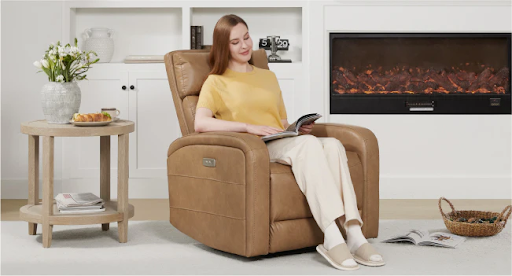Choosing the Right Recliner for a Good Night’s Rest

Sleeping in a recliner is a more common practice than many might expect. For some individuals, it’s a matter of comfort, while others find it necessary due to specific health conditions. This article examines why people choose to sleep in recliners, the associated benefits and risks, and offers tips for achieving better sleep in a recliner, with insights into options available from CHITA Living.
Common Reasons for Sleeping in a Recliner
Several factors can influence the decision to sleep in a recliner:
- Health Issues: Conditions like acid reflux, sleep apnea, or chronic back pain can make a recliner more comfortable than a traditional bed.
- Post-Surgery Recovery: After surgeries such as hip or knee replacements, a recliner can offer better support and comfort during the healing process.
- Pregnancy Discomfort: Pregnant women, particularly in the later stages, may find a recliner provides relief from the discomfort that often makes bed rest challenging.
- Personal Comfort: Some individuals simply find a recliner more relaxing and supportive than a bed.
- Space Constraints: In smaller living spaces, a recliner can serve a dual purpose as both seating and a sleeping area.
Benefits of Sleeping in a Recliner
Sleeping in a recliner can offer several health advantages:
- Enhanced Circulation: Elevating the legs can improve blood flow, reducing the likelihood of swelling, varicose veins, and deep vein thrombosis (DVT).
- Heartburn and Acid Reflux Relief: For those with gastroesophageal reflux disease (GERD), sleeping with the head elevated in a recliner can help prevent acid reflux.
- Spinal Support: Recliners can help maintain spinal alignment, which is beneficial for those with back pain.
- Reduced Snoring and Sleep Apnea: A reclined, upright position can help keep airways open, reducing snoring and benefiting those with sleep apnea or respiratory issues.
- Comfort During Post-Surgery Recovery: Those recovering from surgery may find a recliner offers an easier and more comfortable sleeping position.
Risks of Sleeping in a Recliner
There are potential downsides to consider as well:
- Restricted Movement: The limited ability to shift positions can cause stiffness and discomfort.
- Blood Clot Risk: Prolonged periods in a reclined position might increase the risk of developing blood clots in the legs.
- Joint and Muscle Issues: Inadequate support can lead to stiffness and discomfort in joints such as the hips, knees, and shoulders.
- Lower Sleep Quality: The confined sleeping position may not offer the same level of restfulness as a bed, potentially leading to interrupted sleep.
Choosing the Right Recliner for Sleeping
When selecting a recliner for sleep, several factors should be taken into account to ensure maximum comfort and support. CHITA Living provides a range of recliners that cater to various needs:
- Comfort Level: Testing different recliners to find one that matches personal comfort preferences is essential. CHITA Living recliners are known for their plush cushioning and ergonomic designs.
- Lumbar Support: Choosing recliners with built-in lumbar support helps maintain proper spinal alignment. Many CHITA Living models come with adjustable lumbar support for a custom fit.
- Adjustability: Models that allow for customization of the reclining angle and footrest position are ideal. CHITA Living offers recliners with multiple adjustment options, allowing users to find their perfect reclining angle.
- Material and Padding: Ensuring the recliner has comfortable upholstery and sufficient padding is important. CHITA Living recliners are available in various high-quality materials, designed for maximum comfort and longevity.
- Size and Fit: Considering the recliner’s dimensions and how it fits in the living space is necessary. CHITA Living offers recliners in various sizes, making it easy to find one that fits your space perfectly.
Tips for Better Sleep in a Recliner
To maximize comfort and health while sleeping in a recliner, consider these tips:
- Optimal Recline Angle: Adjust the recliner to a position that supports the spine without causing strain.
- Use Supportive Pillows: Place a pillow behind the lower back and a neck pillow or rolled-up towel to maintain proper neck alignment.
- Promote Circulation: Slightly elevate the feet to reduce leg swelling.
- Regular Sleep Schedule: Maintain a consistent sleep routine to help regulate the body’s internal clock.
- Create a Comfortable Environment: Ensure the room is quiet, dark, and at a comfortable temperature.
- Stay Active: Take breaks throughout the day to move around and engage in physical activity to avoid stiffness.
- Consult a Professional: If discomfort or poor sleep quality persists, seek advice from a healthcare provider.
While sleeping in a recliner can be beneficial for certain health conditions, it also comes with potential drawbacks. It’s important to weigh these factors and consider individual needs. For those with specific health concerns, consulting a medical professional is advisable. With thoughtful consideration and the right recliner, such as those offered by CHITA Living, achieving a good night’s rest in a recliner is possible. CHITA Living provides a variety of recliners designed to combine comfort, support, and style for a restful sleep experience.





